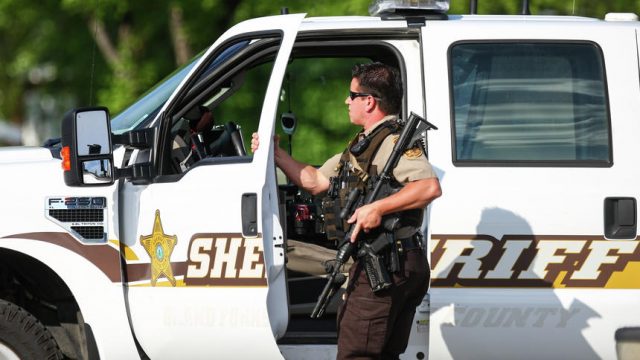Legislation Introduced to Deny Reserve Law Enforcement Officers Power to Arrest, Carry a Gun

A Grand Forks Sheriff sets up a parameter along with multiple different law enforcement agencies after a car chase ended on the west side of Grand Forks on Friday, June 2, 2017. (Joshua Komer / Grand Forks Herald)
Earlier this month Fargo defense attorney Mark Friese wrote a guest post here on SAB regarding the use of reserve officers by North Dakota law enforcement agencies.
“To the surprise of many, including me—a formerly licensed police officer and lawyer—North Dakota law exempts ‘reserve officers’ from licensing, oversight, training, and regulation,” he wrote. “Even more surprising is that certain law enforcement agencies have embraced this exemption as a complete end run on licensing and qualification standards.”
Friese goes on to point out that a recent state Supreme Court ruling in State v. Ngale, which dealt with a reserve officer ordering a chemical test despite not being a licensed officer. The court found that the reserve officer was exempt, by law, from needing to be licensed.
(In the interest of balance, please read newly-elected Cass County Sheriff Jesse Jahner’s response to Friese also posted here on SAB.)
Current North Dakota law allows reserve officers, who are not required to have the same level of training or certification as regular officers, to carry a weapon and make arrests.
Friese’s arguments against this status quo have now taken shape as a piece of legislation. HB1459, introduced by Rep. Mary Johnson (R-Fargo), would still allow reserve officers but would remove from them permission to arrest or carry weapons (full bill below):

What sense does it make, then, to create a class of officers who aren’t required to meet those standards for training and certification but can wield law enforcement’s most important powers anyway?
With so much scrutiny on law enforcement of late, why would anyone want this situation?
Let’s hope Johnson’s legislation gets traction.
[scribd id=397598141 key=key-MYQ7CcZAoivO2vB4wNg2 mode=scroll]




